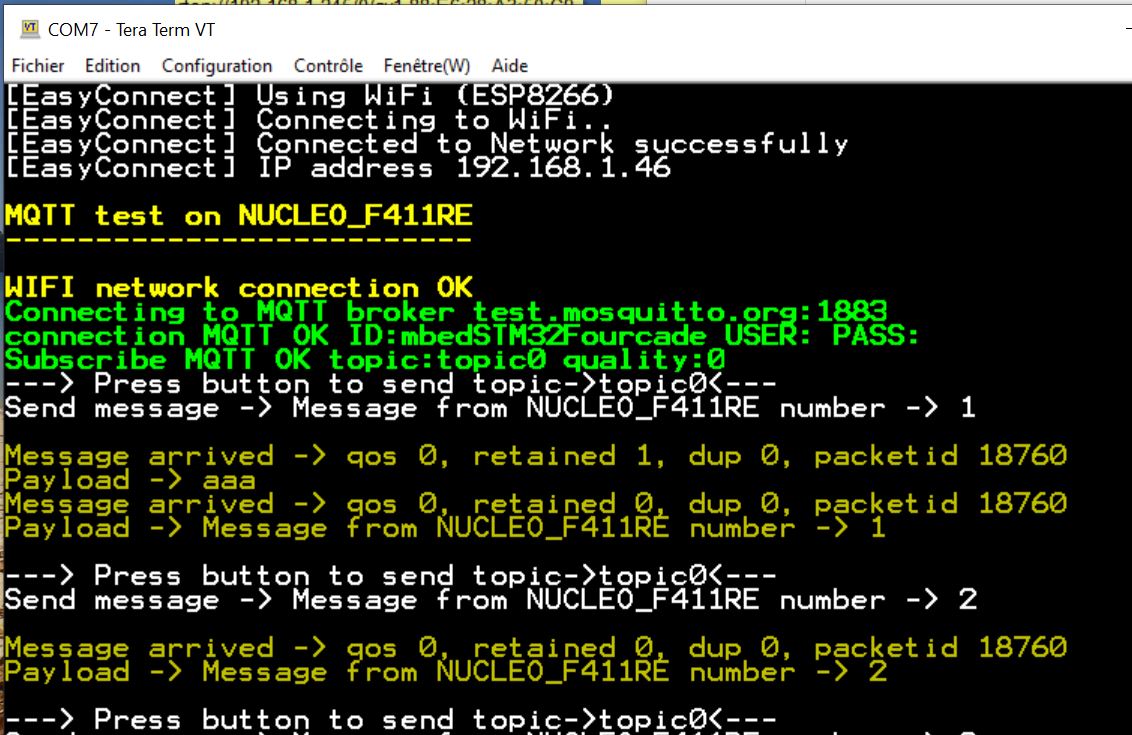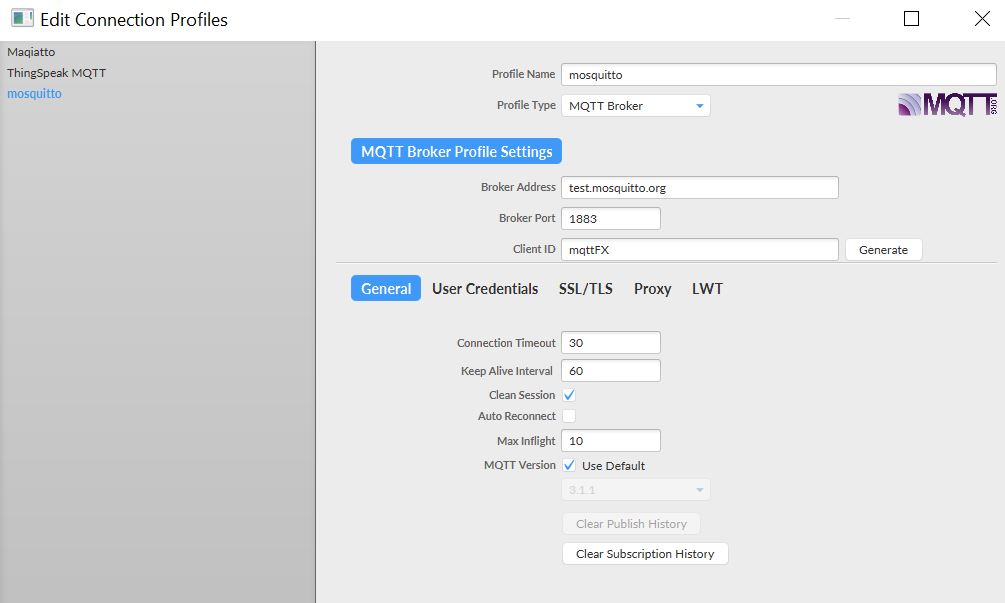Simple demo with GPIO MQTT protocol test on STM32 broker tests.mosquitto.org WIFI interface ESP8266 Issue of topic0 by pressing the button If reception of ', switching of the led If received from 'q' end of program
This is a MQTT protocol test on STM32 NUCLEO The broker is tests.mosquitto.org The WIFI interface is ESP8266
For configuration please check mbed_app.json and #define in main.cpp
Issue of topic0 by pressing the button If received 'l' from broker then switching of the led If received 'q' from broker then end the program
Information and debug with a terminal using UART over USB

This test has been checked with MQTT.fx

main.cpp
- Committer:
- icraggs
- Date:
- 2014-05-11
- Revision:
- 6:e4c690c45021
- Parent:
- 3:7a6a899de7cc
- Child:
- 7:3de634f2d40c
File content as of revision 6:e4c690c45021:
/*******************************************************************************
* Copyright (c) 2014 IBM Corp.
*
* All rights reserved. This program and the accompanying materials
* are made available under the terms of the Eclipse Public License v1.0
* and Eclipse Distribution License v1.0 which accompany this distribution.
*
* The Eclipse Public License is available at
* http://www.eclipse.org/legal/epl-v10.html
* and the Eclipse Distribution License is available at
* http://www.eclipse.org/org/documents/edl-v10.php.
*
* Contributors:
* Ian Craggs - initial API and implementation and/or initial documentation
*******************************************************************************/
/**
This is a sample program to illustrate the use of the MQTT Client library
on the mbed platform. The Client class requires two classes which mediate
access to system interfaces for networking and timing. As long as these two
classes provide the required public programming interfaces, it does not matter
what facilities they use underneath. In this program, they use the mbed
system libraries.
*/
#include "mbed.h"
#include "EthernetInterface.h"
#include "C12832_lcd.h"
C12832_LCD lcd;
#include "FP.cpp"
#include "MQTTClient.h"
class IPStack
{
public:
IPStack()
{
eth.init(); // Use DHCP
eth.connect();
mysock.set_blocking(false, 1000); // 1 second Timeout
}
int connect(char* hostname, int port)
{
return mysock.connect(hostname, port);
}
int read(char* buffer, int len, int timeout)
{
mysock.set_blocking(false, timeout);
return mysock.receive(buffer, len);
}
int write(char* buffer, int len, int timeout)
{
mysock.set_blocking(false, timeout);
return mysock.send(buffer, len);
}
int disconnect()
{
return mysock.close();
}
private:
EthernetInterface eth;
TCPSocketConnection mysock;
};
class Countdown
{
public:
Countdown()
{
t = Timer();
}
Countdown(int ms)
{
t = Timer();
countdown_ms(ms);
}
bool expired()
{
return t.read_ms() >= interval_end_ms;
}
void countdown_ms(int ms)
{
t.stop();
interval_end_ms = ms;
t.reset();
t.start();
}
void countdown(int seconds)
{
countdown_ms(seconds * 1000);
}
int left_ms()
{
return interval_end_ms - t.read_ms();
}
private:
Timer t;
int interval_end_ms;
};
int arrivedcount = 0;
void messageArrived(MQTT::Message* message)
{
lcd.printf("Message arrived: qos %d, retained %d, dup %d, packetid %d\n", message->qos, message->retained, message->dup, message->id);
lcd.printf("Payload %.*s\n", message->payloadlen, (char*)message->payload);
++arrivedcount;
}
int main(int argc, char* argv[])
{
IPStack ipstack = IPStack();
float version = 0.42;
char* topic = "mbed-sample";
lcd.printf("Version is %f\n", version);
MQTT::Client<IPStack, Countdown> client = MQTT::Client<IPStack, Countdown>(ipstack);
char* hostname = "m2m.eclipse.org";
int port = 1883;
lcd.printf("Connecting to %s:%d\n", hostname, port);
int rc = ipstack.connect(hostname, port);
if (rc != 0)
lcd.printf("rc from TCP connect is %d\n", rc);
MQTTPacket_connectData data = MQTTPacket_connectData_initializer;
data.MQTTVersion = 3;
data.clientID.cstring = "mbed-icraggs";
rc = client.connect(&data);
if (rc != 0)
lcd.printf("rc from MQTT connect is %d\n", rc);
rc = client.subscribe(topic, MQTT::QOS1, messageArrived);
if (rc != 0)
lcd.printf("rc from MQTT subscribe is %d\n", rc);
MQTT::Message message;
// QoS 0
char buf[100];
sprintf(buf, "Hello World! QoS 0 message from app version %f\n", version);
message.qos = MQTT::QOS0;
message.retained = false;
message.dup = false;
message.payload = (void*)buf;
message.payloadlen = strlen(buf)+1;
rc = client.publish(topic, &message);
while (arrivedcount == 0)
client.yield(100);
// QoS 1
sprintf(buf, "Hello World! QoS 1 message from app version %f\n", version);
message.qos = MQTT::QOS1;
message.payloadlen = strlen(buf)+1;
rc = client.publish(topic, &message);
while (arrivedcount == 1)
client.yield(100);
// QoS 2
sprintf(buf, "Hello World! QoS 2 message from app version %f\n", version);
message.qos = MQTT::QOS2;
message.payloadlen = strlen(buf)+1;
rc = client.publish(topic, &message);
while (arrivedcount == 2)
client.yield(100);
rc = client.unsubscribe(topic);
if (rc != 0)
lcd.printf("rc from unsubscribe was %d\n", rc);
rc = client.disconnect();
if (rc != 0)
lcd.printf("rc from disconnect was %d\n", rc);
ipstack.disconnect();
lcd.printf("Finishing with %d messages received\n", arrivedcount);
return 0;
}